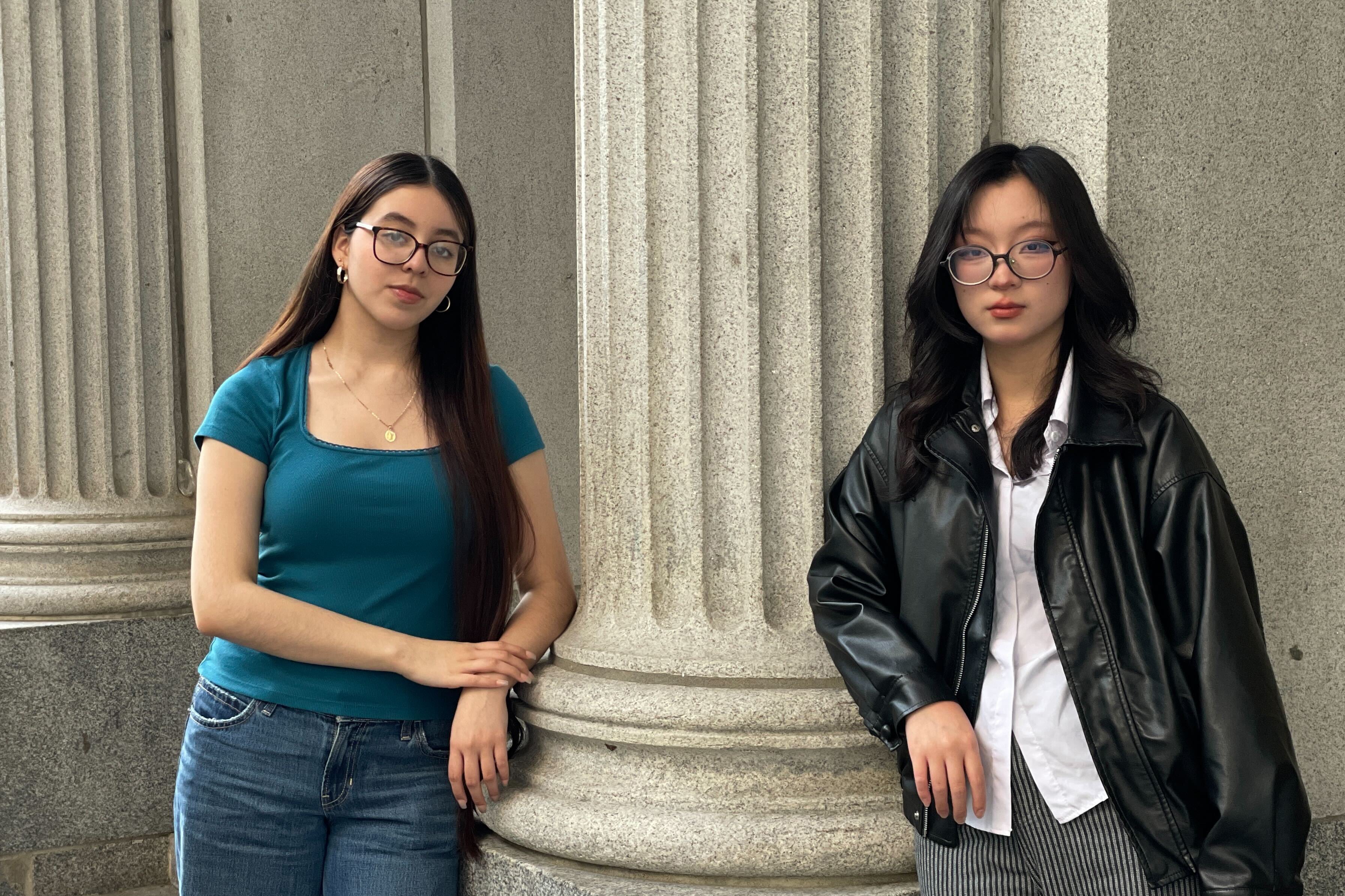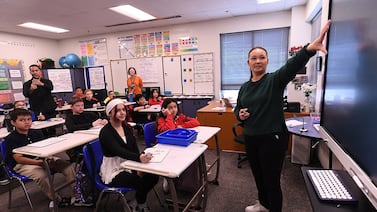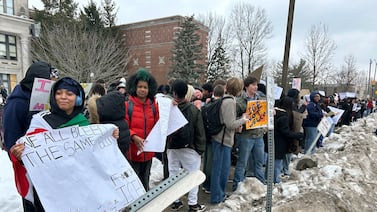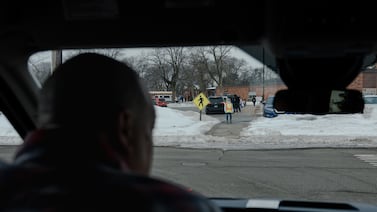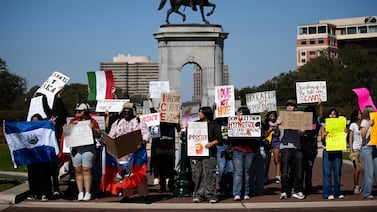Sign up for Chalkbeat New York’s free daily newsletter to get essential news about NYC’s public schools delivered to your inbox.
Why do so many young people lack the fundamentals of civics knowledge? Is the education system adequately preparing future generations for active participation in democracy? Do New York City teens know there’s a big mayoral race coming up — and can they name any of the candidates?
Producers Jasmyn Centeno, a senior at Uncommon Leadership Charter High School, and Annie He, a senior at John Dewey High School, tackle these questions head on. They talk to their P.S. Weekly peers who are focusing on the upcoming mayor’s race to hear more about Gen Z’s behavior: They may actively repost social media content about politics, but that doesn’t necessarily translate into voter action.
Jenna Ryall, the Education Department’s director of Civics for All, explains the city’s efforts to get young people to “practice” democracy before they’re expected to participate as adults. The goal, she says, is to help students engage in civil conversation and make sense of the information around them.
Civics education isn’t about teaching students what to think, Ryall said. “We are teaching them how to think.”
P.S. Weekly is available on major podcast platforms, including Apple Podcasts and Spotify. Reach us at PSWeekly@chalkbeat.org.
P.S. Weekly is a collaboration between Chalkbeat and The Bell, made possible by generous support from The Pinkerton Foundation.
Listen for new P.S. Weekly episodes Thursdays this spring.
Read the transcript below
Annie: Uh, Congress, okay, uh, who has the power to approve the federal budget?
Jasmyn: Oh, my goodness.
Annie: A, President, B, Supreme Court, C, Congress, D, Vice President.
Jasmyn: Wait, wait, wait the what?
Annie: Uh, approve the federal budget. Federal budget.
Jasmyn: Okay, it’s not vice
Jasmyn: Welcome back to P.S. Weekly, the sound of the New York City school system. I’m Jasmine Centeno
Annie: And I’m Annie He
Jasmyn: You’re listening to me and Annie playing a civics game, the great American political quiz.
Jasmyn: Oh, hold on, hold on. Let me cook. Let’s say Congress.
Annie: Oh, you’re right! Let’s go!
Jasmyn: I really freestyle that one. I can’t lie.
Annie: We know, but it’s not–
Annie: Which amendment provides their rights to bear arms, A, First Amendment, B, Second Amendment, C, Third Amendment or, D, Fourth Amendment,
Jasmyn: The right to bear arms. Oh, no, I got this one chill. Shout out, my history teacher. It’s B
Annie: B,
Jasmyn: Yes,
Annie: Yeah,
Jasmyn: Okay, thank you! I was about to say loud and wrong.
Jasmyn: What is a Super Tuesday?
Annie: A Super Tuesday, yo?
Jasmyn: What is a Super Tuesday, the day of the general election, the day of the electoral vote count, C, a day when multiple states hold primaries or caucuses, D, the day of the presidential inauguration.
Annie: Super Tuesday that sounds like of a Black Friday. Like I can’t lie.
Jasmyn: This is under federal electoral system.
Annie: I’m gonna take a while, I guess, and say it’s B.
Jasmyn: No, it’s C,
Annie: What was C?
Jasmyn: A day when multiple states hold primaries or caucuses. Super Tuesday.
Annie: Super Tuesday? What!?
Jasmyn: What’s so super?
Annie: Okay, well, playing that game just reminded me of the time when I was playing a Kahoot about the US government, which was meant for eighth graders, mind you, in my macroeconomics class, and everyone was getting the questions wrong, including me. And it was in that moment, I realized that, okay, maybe I don’t know that much about civics, even though I had been swearing to myself, I do. It was kind of crazy. Well, now this revelation prompted me to do some research into how well people my age understand civics, but not just my age, you know, just the American population, and what I found was, well, the word surprise couldn’t even describe what I had found, and it was just so baffling. Because what do you mean that one in every three Americans cannot name a single branch of government? Is our educational system really failing us that badly?
Jasmyn: I don’t have an exact civics course, but classes like my AP, government and politics class incorporate forms of civics within the curriculum. Within my class, my favorite teacher, she would just go beyond simple history, and instead she’d dedicate 10 to 15 minutes to the start of class to have a discussion on what we call current events. And this would lead into even bigger discussions, where my teacher, she would go into the logistics of how executive orders work, or trying to tie these discussions back to class.
Annie: And understanding what civics is and how it can be applied to real life is a significant topic people should be aware of, especially in this political climate. We decided to talk with our own fellow reporting interns at PS weekly. They’re working on a story about the upcoming mayoral election, and we figured they might have some thoughts. Could you two please state your name, your grade, and the school you currently attend?
Jojo: Hello. My name is JoJo Fofana. I go to Fordham High School of the Arts. I’m in 12th grade,
Roberto: and I’m Roberto Bailey, and I’m a junior at Hunter College High School.
Jasmyn: Have you two ever taken a class in your school that’s specifically for civics, or to learn about civics,
Jojo: not really,
Roberto: No.
Jojo: I mean, you know, there’s this, just like, overlap, right? Like AP government, we had to do, like a fake presidential campaign, but like, when it came to, like, you know, you should vote. I don’t know you ever, you ever get that?
Roberto: No. And I also think that there’s not a lot of required courses about civics, at least in my experience. You know, I’ve taken history, but a lot of these electives, things like AP government, are electives. They’re not something that the school tells us we have to take to graduate. So I think that even if it’s an option, like, for example, my school does offer AP government, it’s not an option a lot of people take.
Annie: So how well do you think you’re like, how well is your understandings of civics, as you know, in general?
Roberto: I guess I think that I understand it to the extent that I think I have enough, like, knowledge of the way that our government, on a local and on a federal level, functions. AndI think that’s a lot of what civics is about. It’s about engaging with the way that a nation is set up. And then JoJo and I have been working on an episode primarily about local politics and local elections. So I think that has also taught us a lot about civics, both in a broad sense, but also kind of getting down to the granular.
Jasmyn: So you mentioned you were working on a piece about local government. What inspired you two to choose such a topic in the first place?
Jojo: Probably just pent up anger. I’ve always been sorry. I know that’s a crude response, but I’ve always been fairly angry about how apolitical, the consensus has been these days, I think a lack of voting has caused a lot of problems, and I think this need to feel unproblematic, and this need to feel I don’t want to be responsible for stuff, I don’t want to give my opinion, has caused the rights of minorities, the rights of women, the rights of people from like my home country to been absolutely demolished, and it’s disgusting. I also have some thoughts about our recent mayor.
Roberto: Yeah, I agree. I think, you know, I see a lot of my peers, a lot of young people, be engaged politically in the sense that they’ll, you know, repost an Instagram story. There’s a lot of reposting going on, and there’s not a lot of voting going on.Our age group Gen Z is that we vote the least. It’s just the way that it is. And on so many levels, like this kind of surface level engagement with politics, without having people actually go to the polls. It’s ridiculous. And so I wanted to delve into why that’s happening, why we have people who might be engaged on the surface, but who aren’t actually putting in the work to affect the change that they kind of claim to care about.
Jasmyn: Could you describe what your piece is about?
Roberto: Yeah, for sure. So what we wanted to cover with our piece is youth engagement in the mayoral election. So the Democratic primary is coming up. It’s in late June in New York City, and we’ve seen historically that there’s not a lot of youth engagement. So what we want to do is assess why, and talk to some people who are trying to make a difference to change that.
Jojo: We also talked to, like, a fair bit of our own students. So not my own students, but our, like, classmates, our friends. And we wanted to gauge what that participation was, and when I, like, talked to my classmates, spoiler alerts, it was fairly low. And it was like, like, low to the point of Wait, we had a mayor. Wait, who’s mayor Adams again? Wait, Cuomo. What is he like? Was he like a senator? They didn’t even know who Cuomo was!
Annie: Oh, my God!
Jojo: I know!
Annie: That’s crazy.
Ave: Okay, that blew up the microphone.
Jojo: Did we break the sound barrier a little bit?
Ave: A little bit?
Jojo: But yeah, it was, like, really concerning. Like, Roberto was it better on your end?
Roberto: When I talked, I mean, I have some very politically active friends, so they did know that we, they did know Mayor Adams, but I think that a lot of people, even if they know kind of the basics, they might know a little bit about civics, they might know a little bit about the candidates, they still aren’t voting. Like the majority of people in my school, even if they’re 18, haven’t registered to vote, and you can register as early as, I believe, 16 in New York. So there’s nothing stopping a lot of people from registering to vote, and yet they don’t do it. So that’s something we really wanted to look into.
Jasmyn: So what did you two learn in the course of reporting that kind of fill these gaps left from your education.
Jojo: I think empathy, like, I think like the, because, you know, it’s easy to like, you know, say that 20% of like Gen Z is in voting, right? But it’s another thing to actually like talk to people. Because, like, I talked about 15 of like the classmates went to like everybody, even kids I didn’t know. And I just, like, asked them, How many candidates could you name? And I kept asking them, why? And I kept getting these very human responses, such as, I didn’t get the time. I don’t care. Why don’t you care? Well, I don’t care because they don’t care about me, right? And, you know, it goes from these teachers don’t care about it. So why do I care? You know, I never liked, the politics makes me very angry. I don’t have enough time, you know, I don’t–very reasonable responses because, you know, I’m 17. Why does it matter?
Roberto: Yeah, and I think it’s not just the teachers who don’t care, but the candidates. Something that we learned in our reporting is that a lot of these campaigns are geared towards older voters because they’re expected to vote more. There’s a reason why the kind of Boomer generation has such a chokehold on our political system. And so I think that when people don’t see themselves reflected in candidates, when the people running are usually not even like Gen Z or millennial, they’re on the older side, and so people don’t see themselves represented in these candidates, and they don’t see themselves. They don’t see these candidates advocating for issues that they care about. So I would say that over the course of reporting this story, what I learned was really like, I learned more about how, where these gaps are coming from. Like, why is it that on the education side? Like, yes, there’s like, aspects where students aren’t learning about civics, they’re not being engaged in civics, but then from kind of all levels, they’re being ignored. Young people aren’t our voices aren’t being heard, and I think that that is kind of the root cause of all of this.
Jasmyn: That was Jojo Fofana and Roberto Bailey, and they’ll be going more in depth in the mayor’s race next week. When we come back from the break, we’ll discuss a program called Civics for all stick around you. We hope you enjoy listening to PS weekly as much as we enjoy making it.
Amy: I’m Amy Zimmer with Chalkbeat New York. We spend a lot of time planning each episode, setting up and conducting interviews, cutting the tape, writing scripts. It’s a long process and totally worth it. But here’s the thing, we don’t have a bunch of money or millions of followers, so we’re counting on you loyal listener to help us get the word out. Take a few seconds and send this link wherever you’re listening to three friends so they too can enjoy PS weekly. Thanks for your support.
Jasmyn: Welcome back to P.S. Weekly. When we were last with you, we discussed with JoJo and Roberto their own experiences with civics at their high schools.
Annie: So we’ve mentioned the word civics, like, what, a million times by now. But what exactly does civics mean? In short, civics means the study of rights and the duties of citizenship.
Jasmyn: Civics courses ensures that students have a better understanding of how the government works and the civic responsibilities we all hold.
Annie: Exactly! Civics is one of those subjects that might not seem important at first, but once you really get into it, you kind of see just how much it affects our daily life. Being able to understand how laws are made and how to speak up on issues really matters. So my school, John Dewey high school doesn’t have a standalone civics class. However, we do have something called the seal of civic readiness, which is actually part of a largest Civics for All Initiative. Now you may be wondering, what’s that well, let’s hear directly from someone who knows it best.
Jenna Ryall: My name is Jenna Ryall. I’m the Director of Civics at New York City public schools.
Jasmyn: Jenna Ryall has been working as a Director of the Civics for all at the New York City Department of Education since at least 2019 co-designing the Civics for All initiative, a comprehensive K-12 civic education program available to all NYC DOE schools.
Jasmyn: Can you start by telling us a little bit about the Civics for All programs and your role as its director?
Jenna Ryall: Absolutely. So Civics for All has a cute name, which started during the de Blasio administration. But what we’re really we’re just the civics department. We’re part of this department of social studies and civics. And at the time, I was on the social studies team here at the central office, and we kind of stopped for a second and we’re like, What do you mean? Start teaching civics in New York City public schools. Like we thought that that’s what we were doing as part of our social studies work, and so it required us to take kind of a closer look at what we were doing in Social Studies Education in New York City public schools. And we had, at that point, a curriculum that had been written by New York City teachers and New York City administrators that had been in schools for a few years. And we took a good look at that and realized that we were, if we do say so ourselves, like doing a pretty good job of teaching the foundations of American government, right? So, like, what I sometimes refer to as old civics, like just the basics three branches of government, like these are the facts about government. We were not doing at that time within our curriculum was helping students understand what that then meant for them. So like, you get the foundations of American government, what does it mean for you? How does the system impact you? And how do you impact it? And so from that finding of ours, grew the civics for All Initiative. And so the idea was that we would put together a multi component initiative that would help students take that understanding, that foundational understanding of government and apply it to their lives.
Jasmyn: Would you say that was like the core goal is to bring advocacy just for like civics across the board.
Jenna Ryall: The core goal of Civics for All is to get young people the opportunity to practice democracy before they are expected to participate in it after school. And so our goal is helping students understand at the different phases of their schooling, what their role is in their communities, and then make sure that when they are 18 and out in the world, that they can participate in our democracy, in whatever makes the most sense for them.
Jasmyn: How would you define seal of civic readiness?
Jenna Ryall: So the seal of civic readiness, I was on the task force at the state level that put it together. So what this seal is it’s a recognition on a student’s diploma that they have made the effort to engage as a member of their community, and that they are leaving high school ready to be an active and engaged member of that community and a positive force for change in the community and the city.
Jasmyn: How do you think the lack of civic knowledge affects young people’s ability to engage in democracy?
Jenna Ryall: You cannot participate in a system that you don’t understand. And so what we really need to do is starting with our youngest students, is think about what is that progression of learning that will make sure that when our students are adults, that they are well prepared and knowledgeable about the system that impacts so many aspects of their lives so that they can participate in it and use it in the ways that they need to to be successful in adulthood.
Jasmyn: How would you respond to, like, some concerns that some people have about teaching civics, especially when, like, there’s this polarized environment within classrooms.
Jenna Ryall: I think the most important thing for people to understand about civics is that there is not a teacher in the system teaching civics who is teaching students what to think? We are teaching them how to think. So the idea is that students need to be taught how to think critically, how to engage in civil conversation, how to take in the information around them and make sense of it, and that is what teachers are doing in civics education. So if we are hearing criticisms of civic education. And you know, I do hear some, I think what you’re implying there is that there’s part of that polarization is a result of maybe polarization in the classroom or teaching a specific way of thinking, and that’s not what civics education is.
Jasmyn: I asked Jenna Riel about some of the challenges she faces when it comes to integrating programs like Civics for All within schools.
Jenna Ryall: The biggest thing is time and then also prioritization. Civics is not a mandated content area. So it’s mandated in the sense that our 12th graders have a half year course on participation in government, and it is in the social studies standards, lightly, I would say, from New York State. But the what we are teaching through Civics for All is not mandated. And so that can be difficult too, because there’s so many conflicting priorities for teachers, because there’s so many things that are important to young people, right? Civics isn’t the only thing, and so figuring out how we can best support teachers to integrate this in a way that makes sense, and be sure that there is enough time in their day so that if they’re integrating it, they’re doing it alongside something else that students need.
Jasmyn: Yet, when successfully implemented, there can be advantages and these sort of success stories that come about as a result.
Jenna Ryall: So one of our favorite programs is it’s called Project Soapbox, and we do it in collaboration with the organization Mikva challenge, and so students to public speaking curriculum, and so students write a two to three minute speech, they research an issue that matters most to them. So the question is, what is the biggest issue facing young people in your community, and what should we do about it? That has started so many students civic journeys from our youngest students, who we had a kindergartener once write a speech about how the kindergarten and the fourth grade were in the cafeteria at the same time, and that was really impacting him, and he wrote a speech about it, and then had a conversation with the principal, and was able to bring about that change. The power of that for a kindergartener to have been able to speak up and then advocate for something and see the change like that has completely changed that kid’s trajectory, right? And then we have, you know, the more high school versions of that, where we have students who have written these soapbox speeches and then been connected to some of their elected officials and have helped to bring about, like, real, lasting change in their community. We had a school in District 25 who had had a student who was injured by a car on the street where their school is located. There is now a, think it’s a traffic light. There’s a traffic light and a curb cut there because they advocated to the Department of Transportation that they needed those things. So like, those are small cases, but I think just in general, what we’re really seeing is young people understanding the power of their voice. If you could leave our listeners with one message about why civics education matters, what would it be?
Jenna Ryall: Civics education matters because civics is the water you swim in. You don’t realize how much all of the other things that you are learning about can be touched by civics. It’s really how you exist in the world and how you exist in community with other people. And so when you think of it that way, it’s hard to think about what isn’t civics and what’s not important about it. Does that make sense?
Jasmyn: Of course!
Jasmyn: That was Jenna Ryall, the Director of the Civics for All at the New York City Department of Education.
Annie: All right. So Jenna mentioned that civics courses aren’t mandated, and, wow, I, I’m totally disagree with that. I really think that civics courses should be mandated because, as a, well, I’m 18, so which means I’m eligible to vote and I can participate in the upcoming Mayor election. However, I know nothing about, like, you know the candidates, hell, I don’t even know their names.
Jasmyn: Yeah, no, coming from a different perspective, low key, having a quote, on, quote civics course, my AP US government and politics class, we’ve actually had like, news 12 reporters come into our school and kind of, yeah, they were, like, interviewing us, well, interviewing those who are 18 and older and eligible to vote for the presidential election. And during that moment, like we were going over the steps on how to be, how to vote and how to register yourself to vote. And my teacher, she even gave us, like, an extra credit assignment if we registered.
Annie: What? That’s so cool. God, I wish my school had that
Jasmyn: My interest towards journalism specifically came from that class before I remember having no care for US politics or the crazy government in general, I kind of took everything with a grain of salt and would rather zone out in family gatherings whenever politics were even being discussed at the table. She helped me realize that whether I liked it or not, politics was going to catch up to me, and I would eventually have to become engaged in politics, or consider it if I wanted to see changes within my community. This, for me, was where, like audio journalism came into place. To this day, my teacher tells me that when I’m on NPR, I should shout her out. This may not be NPR, but thanks, Miss Perry!
Jasmyn: You’ve been listening to P.S. Weekly.
Annie: P.S. weekly is a collaboration between The Bell and Chalkbeat made possible by generous support from the Pinkerton Foundation, the Summerfield Foundation, and FJC.
Jasmyn: The producers for this episode were me, Jasmyn Centeno.
Annie: And me, Annie He, with reporting help from Chalkbeat reporter Michael Elsen-Rooney.
Jasmyn: Our executive producer for the show is Ave Carrillo, and executive editors are Amy Zimmer and Taylor McGraw.
Annie: Additional production and reporting support was provided by Mira Gordon, Sabrina DuQuesnay and our friends at Chalkbeat. Our engagement editor is Carolina Hidalgo.
Jasmyn: This episode was made using Hindenburg Pro, music is from the Blue Dot Sessions and the jingle you heard at the beginning of this episode was created by Erica Huang.
Annie: Special, thanks to our mentor, Sydney Harper as well. Thanks for tuning in. See you next time.
We make transcripts available for our episodes as soon as possible. They are not fully edited for grammar or spelling.

